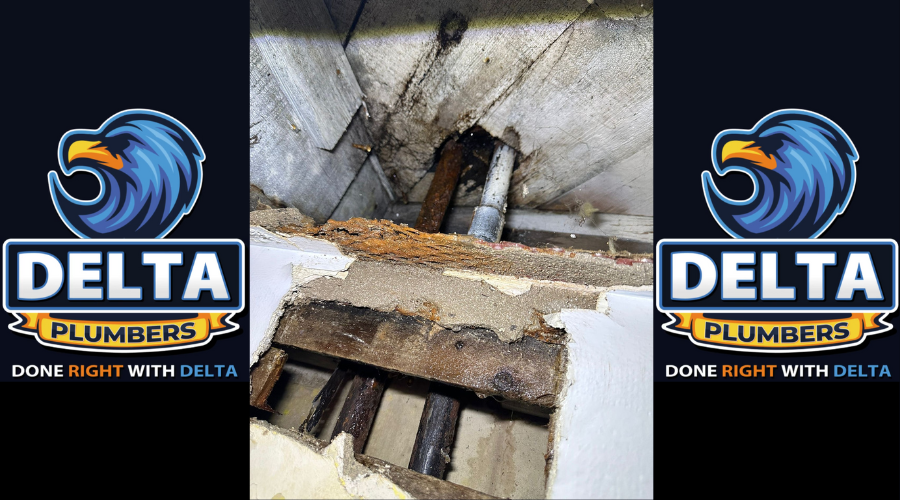Ontario is known for its unpredictable summer weather, including sudden thunderstorms, flash floods, and intense rainfall. These seasonal changes bring more than just puddles to your driveway—they can put significant strain on your home’s plumbing system. Whether it’s stormwater backing up into your basement or tree roots damaging sewer lines, the aftermath can be expensive and stressful. As a homeowner, the best approach is proactive plumbing maintenance. In this guide, Delta Plumbers will walk you through how to prepare your plumbing for Ontario’s summer storms with expert tips and actionable advice. From inspecting gutters to scheduling professional plumbing inspections, these steps can protect your home and your investment.

Picture Source – Delta Plumbers
Inspect and Clean Your Gutters and Downspouts
Clogged gutters and downspouts are a common but overlooked contributor to basement flooding. When rainwater can’t drain properly, it accumulates around your home’s foundation, seeping into your basement and potentially affecting your plumbing system. This pooling water can also increase hydrostatic pressure on underground pipes, leading to cracks or leaks.
Checklist:
- Remove leaves, twigs, and other debris from gutters to ensure proper water flow.
- Check for any sagging sections or loose brackets that might redirect water toward your home.
- Ensure downspouts extend at least 3 feet away from your foundation to prevent saturation of the soil near your home.
Plumbing Tip –
Install gutter guards to reduce maintenance and improve stormwater management. These guards prevent debris from entering your gutters while still allowing water to flow freely. This minimizes the risk of water pooling around your sewer system and reduces the chances of plumbing system overload.
Also Read: Maintain Your Home’s Sewer Line and Avoid Costly Repairs: How to Do It

Picture Source – Delta Plumbers
Test and Maintain Your Sump Pump
Your sump pump is the first line of defence against basement flooding. Designed to collect and redirect groundwater away from your home, a functioning sump pump can save you thousands in flood-related repairs. Before summer storms hit, it’s essential to ensure it’s in proper working order.
Steps to Prepare Your Sump Pump:
- Pour a bucket of water into the sump pit. If the pump activates and discharges the water efficiently, it’s working properly.
- Check the discharge line outside your home for clogs, blockages, or ice buildup (if late spring).
- Clean the pump inlet screen to remove sediment or debris.
- Test the backup power system. If your pump relies on electricity, consider installing a battery or water-powered backup system for added reliability during outages.
Plumbing Tip –
Schedule annual sump pump inspections with Delta Plumbers. Our professionals can detect early signs of wear and recommend upgrades or replacements if needed.
Also Read: Professional Faucet Repair is Better Than DIY Solutions: Why?

Picture Source – Delta Plumbers
Backwater Valve Inspection and Installation
A backwater valve is a critical component for homes in Ontario, especially in areas prone to stormwater surges and sewer backups. These valves prevent raw sewage from flowing back into your home through drains and fixtures during heavy rainfall.
How It Works:
- A flap or gate inside the valve allows water to flow out but closes automatically if water or sewage attempts to flow backward.
- It safeguards your basement from contaminated floodwater and prevents significant health and property damage.
Maintenance Tips:
- Inspect your backwater valve annually before storm season begins.
- Make sure the valve is easily accessible, and its cover is sealed properly.
- Clear the valve of debris and check that the flap moves freely.
- Hire a licensed plumber from Delta Plumbers for expert installation or repair.
Plumbing Tip –
Some municipalities in Ontario offer rebates for installing a backwater valve—check your eligibility to save on costs.
Also Read: Top 7 Summer Plumbing Issues and How to Prevent Them

Picture Source – Delta Plumbers
Check for Tree Root Intrusion in Sewer Lines
Tree roots are one of the most common causes of sewer line blockages. During the summer, with increased soil moisture from storms, tree roots can grow aggressively and penetrate your underground pipes through small cracks or joints.
Signs of Root Damage:
- Multiple slow-draining sinks or bathtubs
- Gurgling sounds from toilets or drains
- Unexplained sewer odours
- Frequent backups or the need for repeated drain clearing
Solutions:
- Schedule a professional video camera inspection of your sewer lines. This allows plumbers to visually confirm root intrusion.
- Apply root-killing foam or enzymatic treatments to stop the spread of roots without harming the tree.
- Consider trenchless pipe repair or pipe bursting to remove the damaged section without major excavation.
Plumbing Tip –
Avoid planting trees near your main sewer line. If you already have mature trees nearby, annual inspections are highly recommended.
Also Read: Eco-Friendly Plumbing Upgrades Every Homeowner Should Know in 2025

Picture Source – Delta Plumbers
Outdoor Drainage and Grading Adjustments
Proper outdoor drainage is essential for preventing plumbing issues during summer storms. If your yard is graded incorrectly, rainwater may flow toward your foundation, increasing the risk of leaks, foundation cracks, and plumbing problems.
How to Improve Drainage:
- Evaluate the slope of your yard. Soil should grade away from the home at a minimum slope of 5% (6 inches over 10 feet).
- Install French drains or trench drains to collect and redirect water away from problem areas.
- Use gravel beds or permeable paving stones in landscaping to promote water absorption and reduce runoff.
Plumbing Tip –
Poor drainage can lead to hydrostatic pressure around your foundation, which affects your sump pump system. Correct grading will help lighten its workload and prolong its life.
Also Read: Emergency Plumbing Repairs: What to Do Before the Plumber Arrives

Picture Source – Delta Plumbers
Inspect and Seal Basement Plumbing Fixtures
During intense rainstorms, water pressure in the sewer system can cause backflow into your basement plumbing fixtures. Floor drains, toilets, and even basement sinks can become pathways for floodwater if not properly sealed and maintained.
What to Check:
- Floor drain caps should be tightly sealed. If not in use, consider using a test plug or expandable drain stopper.
- Toilet flanges should sit flush with the floor and be sealed with a durable wax or rubber ring to prevent water and sewer gas leakage.
- Examine caulking around sinks and any exposed plumbing joints for cracks or gaps.
Plumbing Tip –
Install a flood alarm near vulnerable plumbing fixtures in your basement. These alarms detect moisture and alert you to potential flooding before major damage occurs.
Also Read: Professional Drain Cleaning: Why It Is Essential

Picture Source – Delta Plumbers
Schedule a Professional Plumbing Inspection
No amount of DIY preparation can match the effectiveness of a full professional inspection. A licensed Ontario plumber from Delta Plumbers can perform a comprehensive evaluation of your home’s plumbing system to identify potential weak points before summer storms hit. So, prepare your plumbing for Ontario’s summer storms.
What to Expect:
- Video inspection of sewer lines to check for cracks, root intrusion, or blockages
- Functional testing of sump pumps and backwater valves
- Pressure testing of water lines to detect hidden leaks or pipe weaknesses
- Assessment of outdoor drainage, grading, and basement fixtures
Plumbing Tip –
Schedule your inspection early in the season. This gives you time to make necessary repairs or upgrades before heavy storms become frequent.
Conclusion –
Prepare your plumbing for Ontario’s summer storms are inevitable, but costly plumbing disasters don’t have to be. By taking proactive steps—from cleaning gutters to inspecting sewer lines—you can significantly reduce the risk of water damage, sewer backups, and emergency plumbing repairs.
At Delta Plumbers, we specialize in storm-prep plumbing services across Ontario. Whether you need a sump pump upgrade, sewer inspection, or a full home evaluation, our licensed experts are here to help. Don’t wait for the next downpour to test your plumbing—contact us today for a complete storm-prep inspection.









